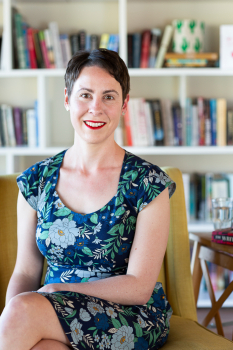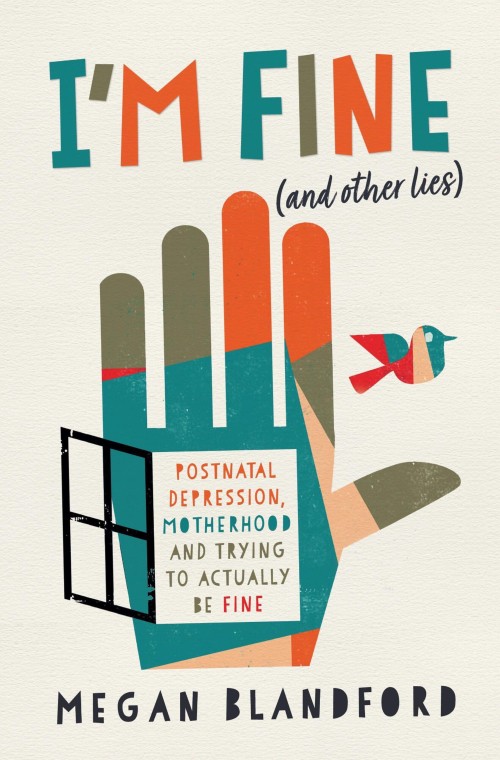Today’s guest post is from Megan Blandford, author of the book I’m Fine (and other lies) which I think is a fantastic title for a book. My husband and I have a running joke that when he asks me how I am and I say “fine”, I am completely not fine! It is interesting how we can struggle to tell even the closest to us how we are really feeling at times.
Megan writes beautifully, with raw honesty and without pretension. In her book, Megan tells the story of how she sank into postnatal depression and anxiety, and how it wasn’t until she faced a life-changing question: What if the enemy inside isn’t the enemy after all? that she won the battle for better mental health.
As parents, we’re pretty great at looking after others, and unfortunately have a reputation for putting ourselves last.
This is especially true when we’re going through a mental health challenge, even though that’s the time most need to nurture ourselves. After going through postnatal depression that lasted for years, I know it’s hard to find the time or motivation to look after yourself. But it’s so important to try.
When it comes to self-care, there aren’t any rules. The truth is, it almost doesn’t matter what you do; the important thing is you’re doing something for yourself.
It sends the message to your mind that you’re worthwhile.
I’ve listed some ideas below; whether you’re going through a mental health challenge or just want to do more to be kind to yourself, you might want to try just one thing to see how you feel with it. Take the one thing that jumps off the page at you, and start slowly.
1. Mindfulness and meditation
Meditating has literally changed my life—but I never thought I’d say those words. Actually, when my naturopath first recommended it, I laughed and politely said, “No, I can’t meditate”.
Her response was simple but powerful: “That’s exactly why you need to try it”.
Once I tried it, I realised all the myths I’d heard about meditating were completely false. The truth is that meditating doesn’t require you to clear your mind, it doesn’t mean you have to say ‘om’, and it doesn’t take up lots of time. It’s all about quietening the mind and creating the space for reflection and mindfulness.
The easiest way to meditate is through a guided app. My favourites are 1 Giant Mind, Smiling Mind (which is great for kids, too), Headspace and Buddhify.
2. Exercise
Moving your body equals better mental wellbeing—it’s that simple and, sometimes, that hard.
If you’re struggling, start small. It doesn’t have to feel amazing yet—that will come—but the important thing is to just go through the motions. There are three things I do to make exercise even better for my mental health:
- Get outside. Fresh air is a miracle worker in making us feel better.
- Be kind to myself. Gentle exercise that doesn’t push too hard can be wonderful when your mind is a mess.
- Find the fun. There are a few exercises in particular that help put a smile on my face (for me, that’s walking, yoga and swimming), so I focus on those.
3. Alternative therapies
This isn’t everyone’s cup of tea, but I love a bit of woo-woo in my life. I’m normally quite a sensible, rule-following, no-nonsense sort, yet alternatives help to balance that out and remind me to follow my instinct.
The two therapies I get the most benefit from are shiatsu (a Japanese-style massage that focuses on energy flow and pressure points) and kinesiology (which looks at the messages your body is sending you through muscle energy). Both are a bit weird, but they make me feel like I’m doing something positive for my wellbeing.
4. Gratitude
I always thought gratitude was trite, until I heard a wonderful talk by Hugh van Cuylenburg of The Resilience Project. He converted me to the idea of focusing on what I’m grateful for. Here’s how:
- Keep a gratitude journal, writing three things that you’re grateful for that day
- Have an accountability partner, to whom you message your gratitude each day
- Talk about it over the dinner table; we do this in our home these days, framed as ‘What was your favourite part of the day?’ to make it easy for the kids. It reminds us all that there’s always something good in a day, even if it’s a tiny thing.
5. Talk to someone
Last, but perhaps most importantly of all, you’re going to need to let some words tumble out into someone else’s ears. There’s just no getting around the fact that talking it through will take some of the pressure off and help make sense of what’s going on.
For me, this gives me the chance to get out of my own head. It reminds me that there are people who support me. They make me laugh, and laughter changes everything. There are a few places to turn:
- Trusted friends and family
- Your partner
- A professional. If you need help, it’s best to chat to your GP or call PANDA’s national helpline on 1300 726 306. Please call Lifeline (13 11 14) if you need urgent support.
What’s your favourite way to practise self-care?
 Megan Blandford is an author and prolific freelance writer.
Megan Blandford is an author and prolific freelance writer.
As a well-respected voice on mental health and parenting, Megan writes for The Age, Sunday Life, Essential Baby, Kidspot, SBS, Whimn, Daily Life, Body+Soul and Headspace.
I’m Fine (and other lies) is her first book, sharing her story of postnatal depression, and the challenges and joys that can be found in motherhood.
Megan lives in north-east Victoria with her husband, two children and a crazy dog. You can find Megan on Facebook here.


